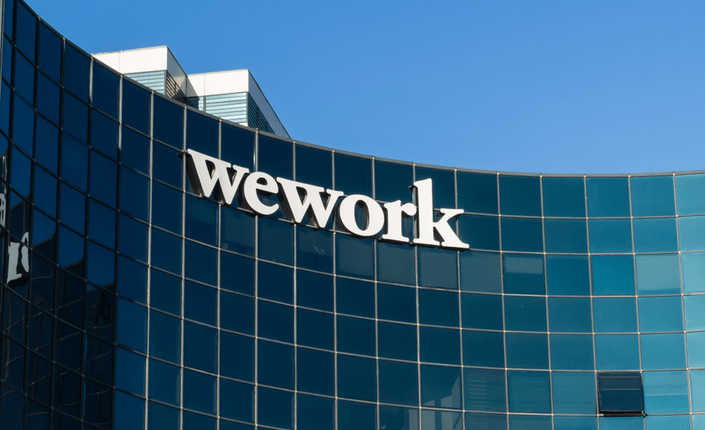
The We Company seems to be on the rise but is the flexible work-spaces aggregator worth its valuation?
A year ago, just a few months after joining WeWork as Head of Enterprise Business, Veresh Sita strode onto a stage at Madison Square Garden during the company’s annual global summit to announce a whole new direction for the company. Blue and red lights beamed around the cavernous arena as Sita addressed 4,000 of his raucous new colleagues.
“You heard earlier speakers talk about this as our equivalent of AWS,” he said, referring to Amazon Web Services, the online retailer’s massively lucrative cloud business. “We have built these amazing workplaces and we’re now able to take these workplaces into enterprises.”
He was talking about a newly launched product called Powered By We, a design, renovation, and office management service. Powered by We was a big expansion from the company’s previous business, which required customers to take space—a desk, a personalized office—inside of a WeWork leased property. Now, WeWork could come to you. What’s more, Sita said, through another new initiative called Global Access, clients could use any site in the WeWork network, whenever they wanted. It gave traveling employees the ability to set up shop somewhere better than a coffee shop or hotel, even on short day trips. “Think of it as a WeWork black badge,” he said.
This was the beginning of WeWork’s push into a wider variety of services for business and beyond shared work-space—which is essentially just a rent arbitrage business. More importantly it was the next step toward better capitalizing on its most prized asset—its community.
WeWork has amassed a $47 billion valuation on the premise that sharing real estate resources will make living and working more efficient and affordable (and fun!) for everyone. Data and analytics, the company professes, will help WeWork cut costs in a way that landlords can’t or haven’t yet. Over the last couple of years, with the help of massive funding from SoftBank, WeWork has stockpiled much of the tools it needs to make good on that promise. It now has a worldwide network of 425 buildings, a small percentage of which it partially owns, and a team of architects, designers, construction experts, community managers, and technologists who can now service Fortune 500 companies on their own turf. Which is to say, WeWork is shifting its business away from rent arbitrage to a higher-margin services business. However, much of its community was built on the back of rent arbitrage, and it still has huge portfolio of leases. If market experts are to be believed, we’re heading for a downturn and, historically, rent arbitrage businesses don’t fare so well under those circumstances. The company is also still growing and spending lots of money on expansion. So, as WeWork surpasses $1 billion in annual losses, many are wondering how much this is all worth.
WeWork has big ambitions to be the one company you need to source all of your real estate needs: a place to co-live, a place to work, a place to work out, a place to learn, a place to grow. From the outset, WeWork intended to offer a variety of accommodations (WeSail) and even financial services (WeBank). Though these verticals aren’t currently being pursued, they reveal a vast vision.
In an effort to clarify that it’s not just a co-working company, but a platform for all aspects of your modern life, WeWork created “The We Company” as an umbrella for its three main verticals—WeLive, WeWork, WeGrow. WeWork remains the most important. It’s the segment that drives all of the company’s current revenue and could fund the rest of its highly ambitious plans.
Where Amazon perfected the everything store, complete with searchable review-laden products, WeWork wants to be the everywhere store, a brand that has a place for everything you need to do. Also like Amazon in its early days, WeWork is losing lots of money. In the first three quarters of 2018, it took down $1.2 billion in losses.
“There’s more than 200 sensors throughout the office,” says Hidalgo. Sprint added thermal sensors at WeWork’s suggestion, but the carrier is analyzing the data itself. “Now we have the ability to figure out where are we using, what are we using, and what are we not using,” he says.
This is just a sliver of the innovation Sita has been driving toward since WeWork hired him 17 months ago. Back in December 2017, before his big Summit debut, he laid out the big vision to me. In a perfect WeWork world, he said, your office will recognize who you are when you arrive, adjust your desk height, dim the lights like you like, and put in an order at the cafe in your office for a latte, skim milk, no foam. It does this because you previously plugged all this information into an app. When you schedule a conference room that’s bigger than you need (it was the only one available), the office management system rearranges the bookings so that each meeting is matched with an appropriately sized room. Sita also talked about exploring a way to gather passive data through beacons or perhaps cameras that could determine employee sentiment.
“I believe that users will give up a degree of anonymity when giving them a level of service in return,” he said at the time.
Read more here
Join us in Bangkok the 19th to the 21st of March for the Property Portal Watch Conference.
